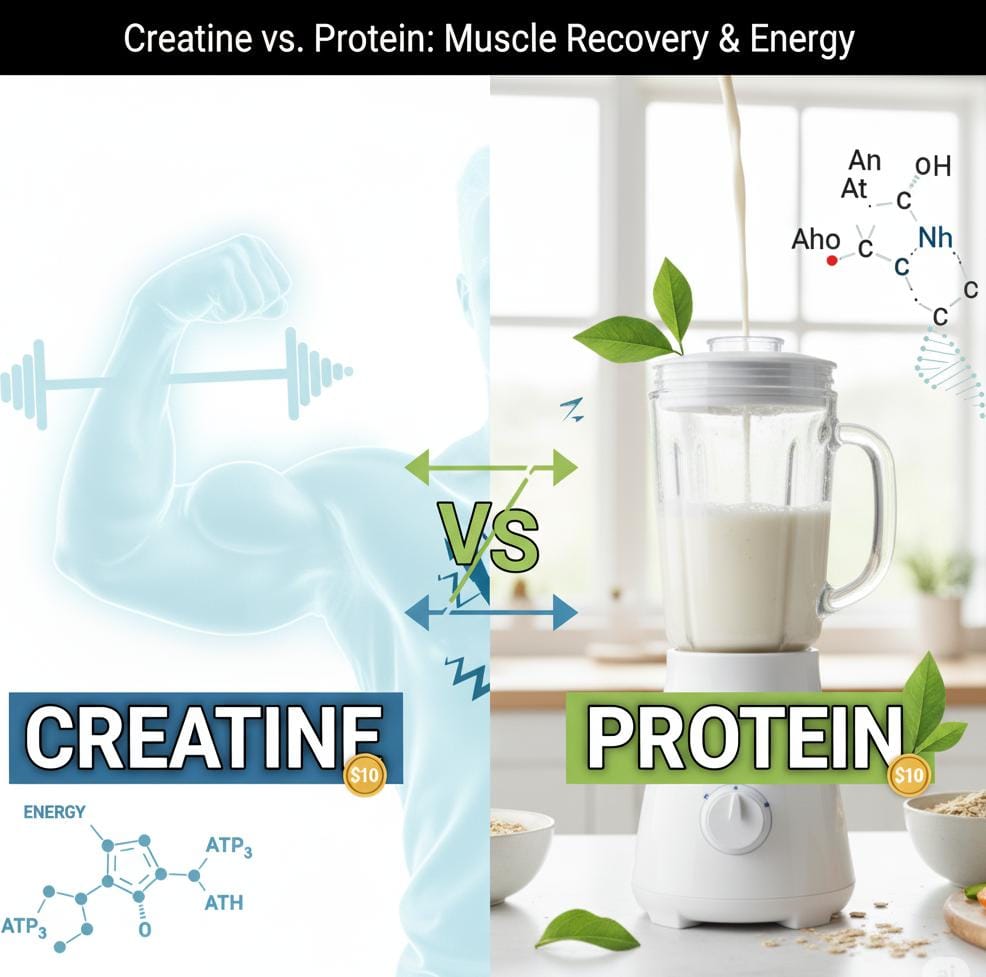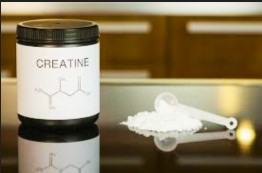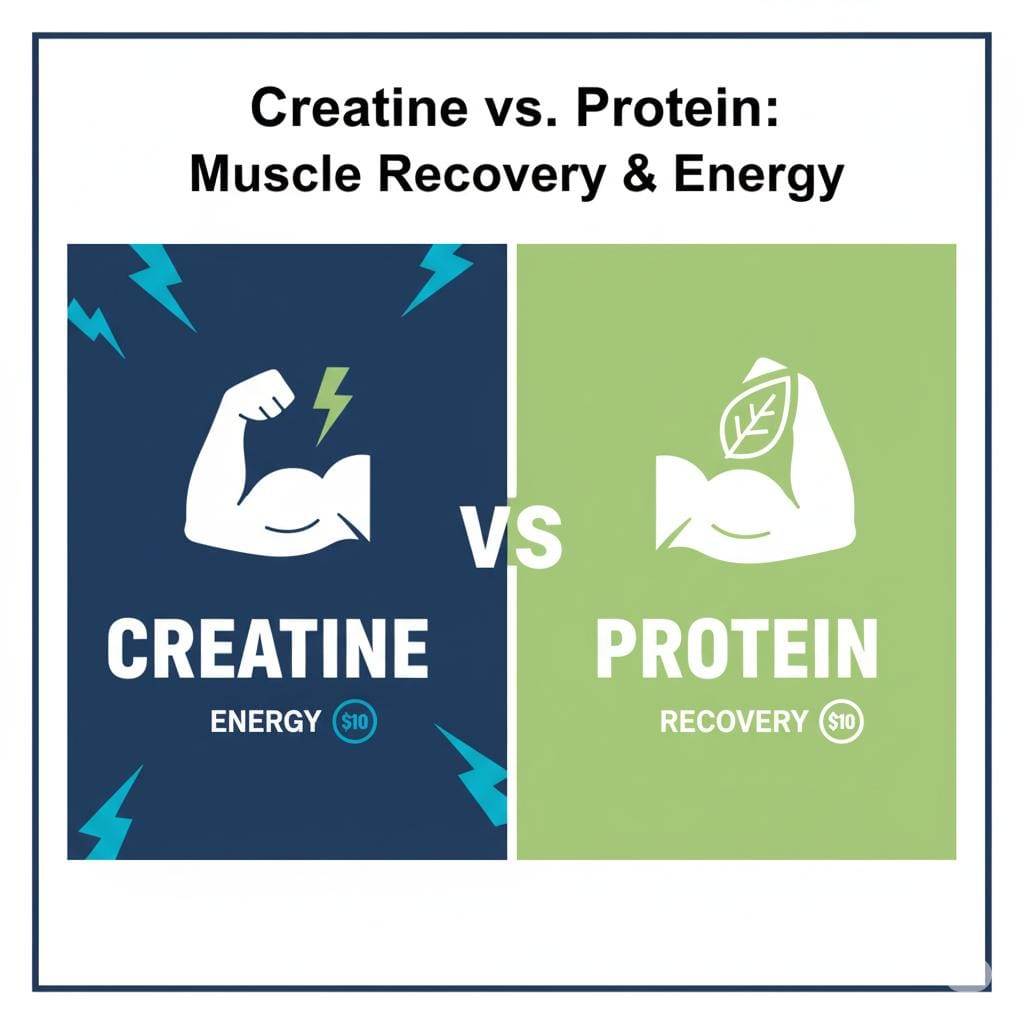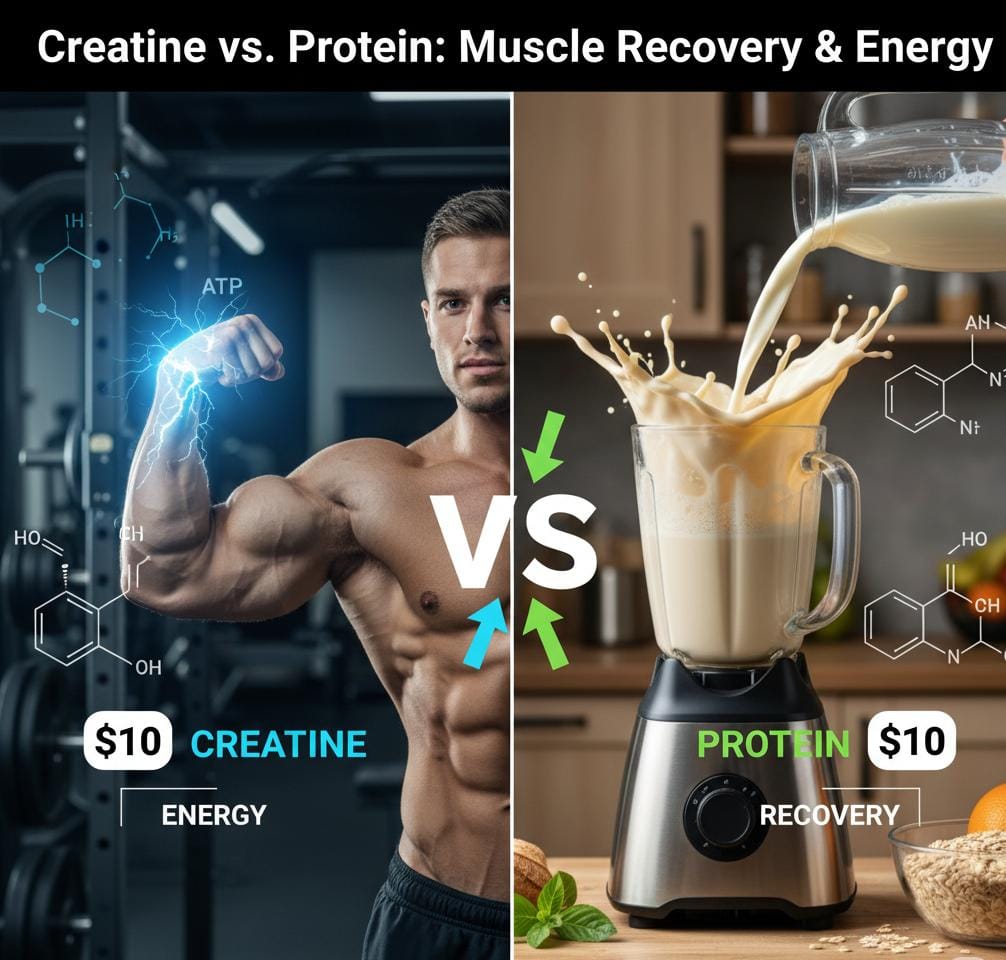Creatine vs Protein The Ultimate Showdown for Muscle Recovery and Energy
Creatine vs Protein the ultimate showdown for muscle recovery and energy, the Creatine powers explosive energy and rapid muscle recovery by replenishing ATP stores during intense workouts.
Protein rebuilds torn muscle fibers with essential amino acids, ensuring long term growth and repair. In the ultimate showdown, creatine vs protein, both reign supreme, creatine for instant energy surges, protein for sustained recovery dominance.
As someone who’s been in the trenches from late-night lifting sessions to prepping for local fitness challenges, I’ve leaned on both to power through plateaus and recover from grueling workouts. Creatine gave me that extra spark to nail those final deadlifts, while protein shakes were my go-to for taming post-gym aches. But here’s the deal: you don’t need to drop a fortune to get started. With options as low as $10, you can dip your toes into the supplement game without breaking the bank.
Whether you’re a newbie just lacing up your gym shoes or a seasoned lifter chasing PRs, this guide will unpack everything you need to know about creatine vs protein, with practical tips, real-world insights, and a sprinkle of science to keep it legit. Let’s dive into the ring and see which supplement comes out on top!
In this Article
- Creatine vs Protein The Ultimate Showdown for Muscle Recovery and Energy
- What’s Creatine, and Why’s It a Gym Game-Changer?
- Protein: The Muscle-Building MVP You Can’t Ignore
- Why Not Both? The Creatine-Protein Power Combo
- Budget-Friendly Picks to Start Strong
- The Final Rep on Creatine vs Protein
What’s Creatine and Why’s It a Gym Game-Changer?
Creatine sounds like something cooked up in a lab, but it’s actually a natural compound your body whips up from amino acids like arginine, glycine, and methionine. You’ll find it in foods like steak or salmon, but supplements, especially creatine monohydrate, supercharge your muscle stores. Think of it as your body’s secret weapon for crushing high-intensity workouts.
Here’s the magic: during a sprint or heavy lift, your muscles burn through adenosine triphosphate (ATP), the energy currency of your cells. Creatine steps in like a pit crew, rapidly regenerating ATP to keep you powering through. Studies back this up, showing creatine boosts performance in short, explosive exercises like weightlifting or HIIT.
It’s like giving your muscles a turbo boost for those moments when you’re pushing your limits.
Creatine’s Knockout Punch for Muscle Recovery
When it comes to creatine vs protein for muscle recovery, creatine pulls no punches. After a brutal leg day you know, the kind where stairs feel like Everest creatine helps reduce muscle damage and inflammation. Research shows it can speed up recovery by lowering post-workout fatigue, making you feel less like a zombie the next day.
In one study, lifters taking creatine after intense sessions reported less soreness and faster bounce-back.
Personally, I noticed a difference when I started mixing creatine into my routine. My recovery days felt less like survival mode, and I could hit the gym sooner without feeling wrecked. If you’re grinding through frequent workouts, creatine’s your ally for staying in the game.
Creatine’s Energy Edge
For energy, creatine is like a shot of espresso for your muscles. By boosting phosphocreatine stores, it fuels short bursts of power, think extra reps on a heavy bench press or a faster sprint. Science confirms it: athletes using creatine see gains in strength and endurance for anaerobic efforts.
It’s why Cross Fitters and sprinters swear by it.
But here’s the catch: creatine’s a sprinter, not a marathoner. If you’re logging long runs or cycling sessions, it won’t give you the same kick. For high-octane, short-burst energy, though, it’s a beast.
Protein: The Muscle-Building MVP You Can’t Ignore
Protein’s the rockstar of nutrition, it’s literally the building block of your muscles, made up of amino acids that repair tissues, produce enzymes, and keep your body humming. You get it from foods like chicken, eggs, or lentils, but protein powders (whey, casein, or plant-based like pea) make it easy to hit your goals, especially when you’re juggling a busy schedule.
Unlike creatine’s niche role, protein’s a jack-of-all-trades. Whey’s fast-digesting for post-workout recovery, casein’s slow-release for overnight repair, and vegan options keep it inclusive. Its superpower? Muscle protein synthesis, the process that rebuilds and grows your muscles after you’ve torn them down in the gym.
Protein’s Power for Muscle Recovery
Picture your muscles post-workout as a construction site after a storm. Protein’s the crew bringing bricks and mortar, specifically amino acids like leucine, to rebuild stronger. A protein shake after training can jumpstart this, reducing soreness and speeding recovery. Studies suggest 20-25 grams post-workout is the sweet spot for most, maximizing repair and minimizing breakdown.
I leaned hard on protein after tweaking my shoulder last year. It helped me hold onto muscle mass while I eased back into training, and the soreness faded faster. If you’re battling post-gym aches or want to keep your gains on lock, protein’s non-negotiable.
Protein’s Role in Keeping Your Energy High
Protein isn’t your go-to for instant energy like carbs, but it’s a slow-burn hero. It supports metabolic enzymes that convert food into fuel and preserves muscle mass, which boosts your resting calorie burn. For endurance junkies, it prevents your body from eating its own muscle during long sessions, keeping energy steady.
Active folks need more, up to 2 grams per kilogram of body weight daily, to fuel these processes.
I’ve found a protein-packed breakfast (like a shake with oats) keeps me from crashing mid-morning, especially on heavy training days.
Creatine vs Protein: The Recovery Rumble
In the creatine vs protein cage match for muscle recovery, each brings unique strengths. Creatine’s like a shield, reducing fatigue and inflammation to help you recover from intense sessions faster. Studies show it’s especially clutch for heavy lifters, cutting down muscle damage after max-effort sets.
Protein, meanwhile, is the repair crew, rebuilding torn fibers with amino acids. If you’re hobbling around post-workout, protein’s your ticket to less soreness and stronger muscles over time. It’s a must if your diet’s low on protein-rich foods.
Who wins? Protein often takes the crown for general recovery, especially for beginners or those with dietary gaps. But if you’re pushing high-intensity workouts, creatine’s recovery boost gives it an edge. Ask yourself: are you sore all the time, or just struggling to recover between heavy sessions?
Creatine vs Protein: The Energy Face-Off
For energy, creatine vs protein is a tale of two styles. Creatine’s the sprinter, delivering quick ATP bursts for explosive moves think powering through a max squat or a 100-meter dash. Research shows it can add strength and delay fatigue in short efforts.
It’s why powerlifters and sprinters keep it on speed dial.
Protein’s the marathoner, supporting long-term energy by preserving muscle and fueling metabolism. It’s less about instant jolts and more about keeping you steady during endurance or high-volume training. If you’re dragging through long workouts, protein’s got your back.
The verdict? Creatine for short, intense bursts; protein for sustained energy over time. Your training style dictates the champ.
So, Which Should You Pick: Creatine or Protein?
Choosing between creatine vs protein isn’t about picking a side, it’s about your goals. If muscle recovery is your main fight, protein’s repair powers make it a staple, especially if you’re not eating enough chicken or eggs. For energy during high-octane workouts, creatine’s ATP boost is tough to beat.
Beginners might start with protein to cover basics, it’s versatile and foundational. Seasoned lifters chasing performance PRs can add creatine for that extra edge. When I started, protein was my ride-or-die; adding creatine later helped me smash plateaus.
Pro tip: Experiment! Try one for a month, track your energy and recovery, then tweak. Your body’s feedback is the best coach.
Why Not Both? The Creatine-Protein Power Combo
Here’s a plot twist: in the creatine vs protein debate, you don’t have to choose. Combining them is like pairing peanut butter and jelly, they’re better together. Creatine fuels your workouts and cuts fatigue, while protein rebuilds what you break down. Together, they’re a one-two punch for muscle growth and recovery.
Research shows no extra magic from mixing, but it’s safe and practical.
Many athletes toss creatine into their post-workout protein shake for convenience. I’ve done this for years it’s a time-saver, and I’ve noticed faster recovery and more consistent energy.
Dosage, Safety, and Real-World Tips
Creatine: Stick to 3 to 5 grams daily, no loading phase needed unless you’re impatient.
Mix it with water or your shake. Watch for mild bloating at first; it usually fades.
Protein: Aim for 1.2 to 2 grams per kg of body weight, spread across meals. A 20-gram post-workout shake is plenty for most. Too much can upset your stomach, so ease in.
Both are safe for healthy adults, but if you’ve got kidney concerns, check with your doctor. My go to? Blend creatine into my protein shake one drink, double benefits.
Budget-Friendly Picks to Start Strong
You don’t need to splurge to jump into creatine vs protein. Creatine monohydrate is dirt-cheap, think $10 for a month’s supply on sites like Amazon. Look for unflavored powders with third-party testing for quality. Protein powders start around $15, but you can snag smaller whey packs for under $10 at places like Walmart.
Skip the flashy brands, basic, tested products deliver the same results. Your wallet and muscles will thank you.
Busting Myths That Hold You Back
Myth: Creatine wrecks your kidneys. Fact: Decades of studies say it’s safe for healthy folks.
Myth: Protein’s just for bodybuilders. Wrong: Anyone active needs it for recovery and energy.
Ditching these myths lets you use creatine vs protein with confidence.
Creatine vs Protein The Ultimate Showdown for Muscle Recovery and Energy
The Final Rep on Creatine vs Protein
In the creatine vs protein showdown, there’s no universal winner, it’s about what fits your vibe. Creatine’s your hype man for explosive energy and quick recovery; protein’s the steady builder for muscle repair and long-term gains. Start with protein if you’re new, add creatine for intensity, or combine them for a killer duo. With options as low as $10, you can experiment without stress. Pair them with solid training and a balanced diet, and you’ll be unstoppable.
So, grab a shaker, pick your fighter (or both), and get ready to level up your workouts. Your muscles are counting on you!











